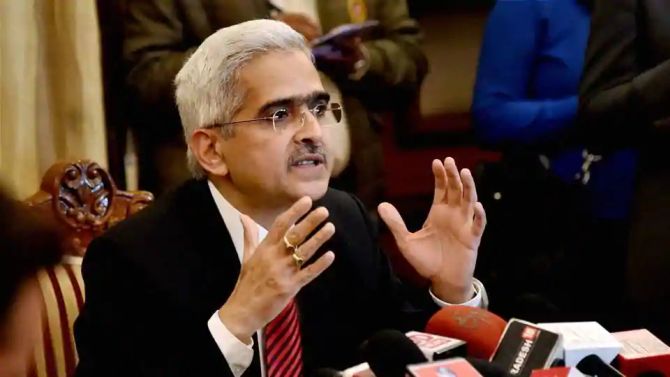'No one cares about fiscal deficit now. Or for that matter, inflation.'
'The focus is on growth and growth alone,' says Tamal Bandyopadhyay.

The Reserve Bank of India did more than what the market was expecting from the central bank.
It cut the policy rate to its historic low; released Rs 3.74 trillion liquidity into the system, already slush with close to Rs 3 trillion average excess money, daily; and discouraged banks to keep the money idle.
It also announced a series of regulatory forbearance for banks to fight the impact of COVID-19 on economy.
Are these measures enough?
Yes for the time being, but if the movement of government bond yield is any indication, the RBI will have to do more.
After the out-of-turn monetary policy was announced, there was a sharp drop in the 10-year government bond yield but as the banks rushed to sell, the yield spiked again before the market closed.
With no risk appetite for dated government bonds, the banks, the main buyers of such papers, are dreading the government borrowing programme which starts in April.
The estimated gross borrowing for fiscal year 2021 is Rs 7.8 trillion.
However, this is bound to rise. By how much is anybody's guess at this juncture.
The government has already announced a Rs 1.7 trillion relief package; tax collections will be severely hit; and the divestment programme cannot sail through in the current market condition.
This means fiscal deficit will rise. And, to bridge that, the government borrowing.
A March 27 note of ICICI Securities Primary Dealership Ltd pegs the actual spend by the government in the Rs 1.7 trillion package at around Rs 70,000 crore as the flow of money under certain heads has already been budgeted but front-loaded now; the relief package also has some non-cash components.
It estimates the fiscal deficit in the current year at 4.1 per cent of GDP and for 2021, 5 per cent -- 1.5 percentage point higher than the estimated 3.5 per cent.
The fiscal deficit of the states can go up to 3.9 per cent in 2021 from the estimated 2.7 per cent.
These figures will rise further as one can presume that there will be more stimulus packages by the government as the situation unfolds.
But no one cares about fiscal deficit now.
Or, for that matter, inflation.
The focus is on growth and growth alone.
And, to ensure that, the government and the RBI -- fiscal and monetary authorities -- work in close coordination.
The government is raising Rs 80,000 crore through cash management bills on March 31.
Banks will pick up the short-term bills but they may not get excited about the dated securities when the auctions start in April even though there is enough liquidity in the system.
If indeed that happens, the yield will rise and negate the impact of the rate cut and flood of liquidity.
The overnight call money can be available at around 4 per cent, but the 10-year government bond yield could inch towards 7 per cent, widening the spread between the policy rate (4.4 per cent) and the bond yield.
So what can the RBI do?
It needs to break the risk aversion of banks and infuse adrenaline in their veins.
Both the Centre and the states borrow money from the RBI through the so-called ways and means or WMA advances to tide over temporary mismatches in the cash flow of their receipts and payments.
It is a sort of working capital for which the central bank sets a limit.
In the second half of the current fiscal, the limit for the Centre is Rs 35,000 crore.
The RBI has the flexibility to revise the limit 'at any time', 'taking into consideration the prevailing circumstances'.
It can offer higher WMA financing to the Centre and the states for the time being till the banks get their risk appetite back.
The RBI can also buy government bonds through the primary dealers involved in the buying and selling of government securities.
It had done so in 2001 after a series of terrorist attacks in the United States on September 11 shocked the global markets, leading to chaos.
Of course, it can continue to buy bonds from the banks through the so-called open market operations to stem the volatility in bond yields.
But what prevents it from buying the bonds directly from the government, through the private placement route?
Section 5 of the Fiscal Responsibility and Budget Management Act allows the RBI to do so.
Also, Section 4 (2) of the Act confirms that it can be done 'on grounds of national security, act of war, national calamity, collapse of agriculture severely affecting farm output and incomes, structural reforms in the economy with unanticipated fiscal implications, decline in real output growth of a quarter by at least 3 per cent points below its average of the previous quarters'.
The very next clause, Section 4(3) of the Act, caps the deviation from the fiscal deficit target at 0.5 per cent of GDP.
I am sure there are ways of getting around this.
In any case, there is no harm in suspending the FRBM Act at this hour of crisis.
Recently, the US signed off a historic $2-trillion stimulus package to fight the devastating spread of COVID-19 -- the largest emergency aid package in the US history, two-and-a-half times the stimulus package it had put in place in 2009 to ease the impact of the collapse of Lehman Brothers that plunged a large part of the world into recession.
The $2 trillion package follows a $1 trillion infusion.
Overall, the size of the stimulus package in the US is 15 per cent of its economy.
India can't afford to go that far as dollar is a reserve currency.
The global rating agencies might not spare it if it does so, but growth will silence them.
Whether it is buying bonds directly or indirectly, it amounts to printing money and expansion in the RBI balance sheet.
Does anybody care about that now?
A part of it will probably erode as the rupee could see sharp depreciation against the dollar.
But that is a small price to pay while fighting the war against COVID-19 which has brought the world to its knees.
Tamal Bandyopadhyay, a consulting editor with Business Standard, is an author and senior adviser to Jana Small Finance Bank Ltd.












 © 2025
© 2025